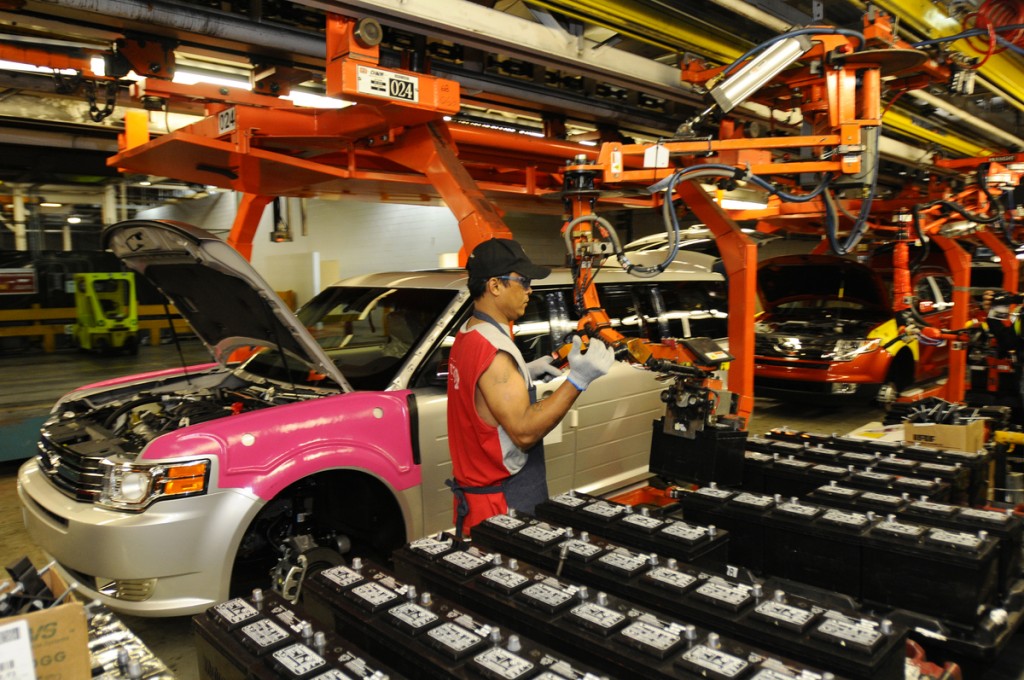
An employee works on a Ford Flex at the Oakville Assembly Plant. (Photo by: Sam VarnHagen/Ford Motor Co.)
TORonTO Fords investment in the Oakville plant west of Toronto is creating hope among unio members and industry watchers that more jobs may come to Canada as demand for cars rebounds to pre-recession levels.
The automaker announced Thursday it was putting $700-million in the plan with the help of government funds in a move it called a win for everyone as well as a sign of the companys dedication to Canadian manufacturing.
Todays announcement is significant for Ford because its about solidifying jobs and about becoming more competitive than ever before right here in Canada, Ford president for the Americas, Joe Hinrichs, said during a news conference in Oakville, Ont.
Not only is this investment helping us to find much-needed capacity for global product and securing these great jobs, its also positioning Oakville as one of the more competitive and important manufacturing facilities in the Ford global manufacturing system.
While the investment doesnt create any new jobs, it will secure those of the 2,800 employees currently at the plant.
Anthony Faria, an automotive expert at the University of Windsor, said Fords level of investment means those jobs should remain safe for at least 10 years, but that new product would have to come into the factory for new positions to be created since the vehicles currently built at Oakville arent big sellers.
RELATED: Ford invests $700 million at its main Canadian plant in Oakville, Ontario
Faria said he hopes Oakville will continue to build the next generation Ford Edge and the next generation of MKX for Lincoln, but notes that both vehicles are built off the same platform as the Ford Fusion, a major global seller.
about the only thing that outsells it for Ford is the F-Series pick ups.
The Oakville plant currently makes the Ford Edge, Ford Flex, Lincoln MKX and Lincoln MKT. Ford says several new models will be brought to the plant to meet demand in North America and elsewher.
The auto industry was among the hardest-hit during the 2008 downturn and, while it has come back strongly, jobs have not kept pace.
On the assembly side, Faria estimates the industry is still 8,000 jobs below the peak before the recession, while the auto parts sector is still down 20,000 as companies remain lean and cautious and further automate some work.
So far, job creation has certainly lagged behind the regrowth of the North America auto industry, Faria said.
Unifor, the new unio created by the merger of the Canadian Auto Workers with the Communications, Energy and Paperworkers unio, called the investment a giant boost for the industry and praised the involvement of both the federal and provincial governments, which had also worked to prop up at industry when it was at its weakest.
Theres a better way for us to manage the economy. When government, companies and unios get in a room to decide what types of jobs we want, we come up with good solutions, said Unifor national president Jerry Dias.
The fact that the government came forward today is great start.
ontario is providing a grant of up to $70.9 million toward the total investment, while the federal government is committing up to $71.6 million.
The investment will mean Fords spending on Canadian-made auto parts will increase by about $200 million to a total of nearly $4 billion annually.
Dias said the unio believes more jobs will follow, noting that Ford has hired 300 people over the last six months and will likely hire as many more when all the dust settles.
The investments and the move to protect jobs are encouraging for his members as well as for young people looking for work after the carnage of the downturn, he said.
People are feeling a lot more comfortable, he said.
During the recession, people had to take a step sideways to a certain extent, people were nervous. People arent as nervous today.
Ford employs about 6,000 people in Canada, while an additional 18,000 are employed in the more than 400 Ford and Ford-Lincoln dealerships across the country.




